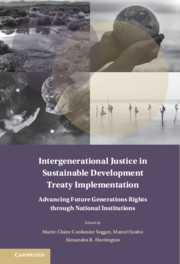 Intergenerational Justice in Sustainable Development Treaty Implementation
Intergenerational Justice in Sustainable Development Treaty Implementation from Part V - Regional Trends in Intergenerational Justice
Published online by Cambridge University Press: 15 October 2021
An unprecedented wave of change has been taking place in the past few decades in the field of environment. The concept of sustainable development is now commonly understood by many people around the world – from its origins during the 1972 UN Conference on the Human Environment (more commonly known as the 1972 Stockholm Conference), up to the recently agreed upon Post-2015 Agenda and the SDGs. The roots of sustainable development go back to the early 1970s, when the UN Declaration in Stockholm proclaimed the second UN Development Decade and the Stockholm Convention first clearly emphasized that environmental protection and economic development must be understood as compatible and mutually reinforcing goals. It has been defined as ‘development that meets the needs of the present without compromising the ability of future generations to meet their own needs’.
To save this book to your Kindle, first ensure [email protected] is added to your Approved Personal Document E-mail List under your Personal Document Settings on the Manage Your Content and Devices page of your Amazon account. Then enter the ‘name’ part of your Kindle email address below. Find out more about saving to your Kindle.
Note you can select to save to either the @free.kindle.com or @kindle.com variations. ‘@free.kindle.com’ emails are free but can only be saved to your device when it is connected to wi-fi. ‘@kindle.com’ emails can be delivered even when you are not connected to wi-fi, but note that service fees apply.
Find out more about the Kindle Personal Document Service.
To save content items to your account, please confirm that you agree to abide by our usage policies. If this is the first time you use this feature, you will be asked to authorise Cambridge Core to connect with your account. Find out more about saving content to Dropbox.
To save content items to your account, please confirm that you agree to abide by our usage policies. If this is the first time you use this feature, you will be asked to authorise Cambridge Core to connect with your account. Find out more about saving content to Google Drive.